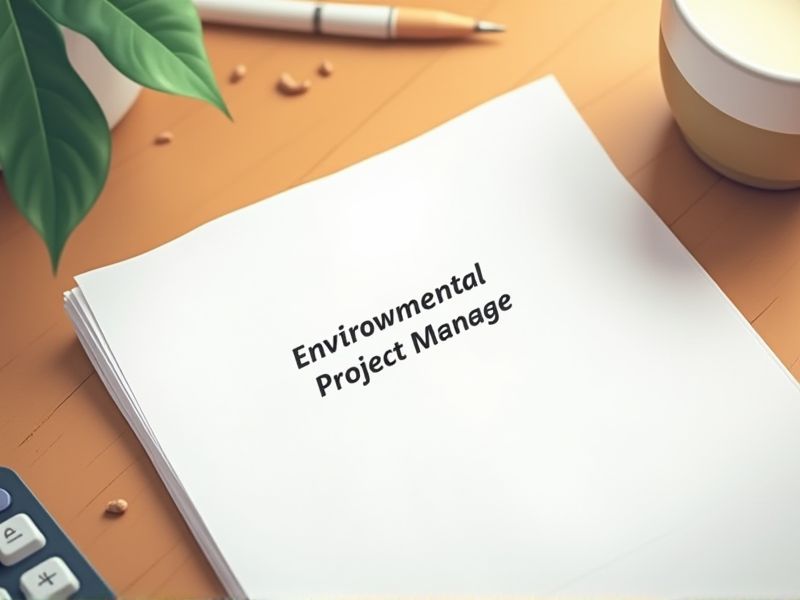
An Environmental Project Manager plays a crucial role in overseeing projects that impact ecosystems, making informed decision-making necessary. Certain certifications enhance their ability to manage complex environmental regulations and sustainability standards. These credentials ensure they are equipped with the latest knowledge on environmental policies and industry best practices. Here are some important certifications for an Environmental Project Manager.
Project Management Professional (PMP)
Obtaining the Project Management Professional (PMP) certification helps an Environmental Project Manager ensure projects meet regulatory compliance standards by applying a structured oversight process. The PMP credential signifies proficiency in critical budgeting and scheduling, which leads to effective allocation of resources crucial for environmentally sensitive projects. It enhances risk management skills, vital for assessing and mitigating potential environmental impacts throughout project lifecycles. PMP-certified managers often communicate more efficiently with multidisciplinary teams, facilitating clearer collaboration on complex environmental issues.
Certified Environmental Professional (CEP)
In an environmental project, precise compliance with regulations is crucial, and a Certified Environmental Professional (CEP) provides the expertise necessary to ensure adherence to these laws. Their certification signifies a mastery of environmental standards, which reduces the risk of costly legal and procedural errors. A CEP brings a level of professional credibility and trust, encouraging stakeholder and public confidence in the project. They also offer essential insights into sustainable practices, enhancing the project's long-term viability and environmental impact.
LEED Accredited Professional (LEED AP)
LEED Accredited Professionals possess a deep understanding of sustainable design, which enables Environmental Project Managers to implement green building principles effectively. Their expertise in navigating the LEED certification process increases the likelihood of a project achieving its sustainability goals. LEED APs help streamline communication among stakeholders by using standardized terminology and practices. They also contribute to cost savings and resource efficiency by incorporating energy-efficient technologies and sustainable materials into project plans.
Certified Hazardous Materials Manager (CHMM)
Certified Hazardous Materials Managers (CHMM) possess specialized knowledge essential for assessing and mitigating environmental risks associated with hazardous materials. Accreditation ensures that environmental project managers can effectively oversee compliance with environmental regulations and standards. Expertise in hazardous material management minimizes the potential for costly errors, thereby safeguarding community health and project timelines. CHMM professionals provide guidance that enhances sustainable practices, aligning projects with environmental sustainability goals.
ISO 14001 Lead Auditor Certification
Achieving ISO 14001 Lead Auditor Certification equips an Environmental Project Manager with a deep understanding of effective environmental management systems. This expertise ensures projects comply with regulatory standards, reducing potential risks and liabilities. Managers can effectively audit and improve environmental processes, enhancing overall project efficiency and sustainability. The certification also boosts credibility and trust with stakeholders, potentially leading to more opportunities and partnerships.
NEBOSH International General Certificate in Occupational Health and Safety
The NEBOSH International General Certificate provides Environmental Project Managers with comprehensive knowledge of health and safety principles, ensuring project environments minimize risk. Familiarity with health and safety regulations enables these managers to identify, assess, and control potential hazards effectively, leading to safer project execution. This certification enhances the credibility and competence of managers, which benefits organizational reputation and reduces liability. In complex environmental projects, the ability to apply global safety practices is crucial for maintaining legal compliance and ensuring sustainable project outcomes.
OSHA 30-Hour Certification
An Environmental Project Manager benefits from OSHA 30-Hour Certification by understanding workplace safety standards, reducing the risk of accidents on project sites. This certification equips them to identify and mitigate potential hazards, ensuring compliance with federal regulations and fostering a safer work environment. Acquiring this knowledge leads to improved project efficiency and reduced downtime caused by safety incidents. The certification also bolsters credibility and trust with stakeholders, as it demonstrates a commitment to maintaining high safety standards.
Certified Energy Manager (CEM)
Certified Energy Managers (CEMs) possess expertise in energy efficiency, crucial for optimizing resource usage in environmental projects. Their ability to conduct energy audits helps identify potential savings and environmental impacts, enhancing project sustainability. CEMs understand regulatory requirements, ensuring compliance and avoiding potential legal complications for projects. Their skills in energy cost analysis contribute to more accurate budgeting and financial planning, improving project outcomes.
Certified Sustainability Professional (CSP)
Environmental project managers often need a Certified Sustainability Professional (CSP) to integrate sustainable practices into project planning, ensuring compliance with environmental regulations. The CSP certification equips managers with knowledge to identify and mitigate ecological impacts, enhancing project outcomes. It also strengthens a project's credibility, as stakeholders increasingly demand transparency and sustainable practices. Certified managers can often lead to increased investor confidence, driving project success.
Environmental Management Systems (EMS) Auditor - IRCA
The Environmental Management Systems (EMS) Auditor - IRCA certification ensures that an Environmental Project Manager can effectively evaluate and implement sustainable practices. It equips them with the skills to assess compliance with environmental regulations, thereby reducing the risk of legal penalties. With this certification, managers gain a structured approach to identify, manage, and reduce environmental impacts. It also enhances an organization's reputation by demonstrating a commitment to environmental stewardship and continuous improvement.
Summary
You can expect an increased credibility in your role as an Environmental Project Manager with certifications. These credentials improve your ability to secure more complex projects due to enhanced expertise. Certified managers often see a rise in job opportunities and career advancement. Employers frequently prioritize those with certifications, leading to potential salary increases.
